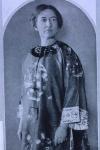Biography
Other info : Bibliography
As founder and editor of Poetry: A Magazine of Verse, Harriet Monroe became instrumental in the "poetry renaissance" of the early twentieth century by managing a forum that allowed poets and poetry to gain American exposure. In the Dictionary of Literary Biography, Daniel J. Cahill and Laura Ingram wrote: "The abundant richness of this movement might well have been less spectacular without the encouragement and vitality which Poetry offered in those years when young poets were seeking to break the bonds of traditionalism and to create a new poetic voice for the modern age."
Monroe established an editorial policy independent of editorial preference or dated literary movements. According to Judith Paterson in a separate Dictionary of Literary Biography entry, Monroe's commitment to such a policy ensured the magazine's success. Paterson quoted the new editorial policy that appeared in the second issue of Poetry: "Open Door will be the policy of this magazinemay the great poet we are looking for never find it shut, or half-shut, against his ample genius! To this end the editors . . . desire to print the best English verse which is being written today, regardless of where, by whom, or under what theory of art it is written."
Monroe honed her love of literature early. Her father's library was the perfect haven for a reclusive child, in a household fraught with parental tension and sibling rivalry. In her autobiography, A Poet's Life: Seventy Years in a Changing World, published two years after her death, Monroe recalls: "I started in early with Shakespeare, Byron, Shelley, with Dickens and Thackeray; and always the book-lined library gave me a friendly assurance of companionship with lively and interesting people, gave me friends of the spirit to ease my loneliness." The nuns and the Victorian seminary curriculum at the Visitation Convent in Washington, D.C., helped smooth over her rough edges. Fueled by fears of posthumous anonymity, she proclaimed after graduation her determination to become "great and famous" as a poet or playwright. As Paterson quoted her, "I cannot remember when to die without leaving some memorable record did not seem to me a calamity too terrible to be borne."
For the next thirty years, she endured financial challenges while displaying an artistic spirit. Though she enjoyed a few notable breaks, she had to cope with harsh realities. Though Century magazine published her poem "With a Copy of Shelley" in 1889, she quickly became disillusioned over the limited earnings available for poets. Paterson quoted Monroe: "The minor painter or sculptor was honored with large annual awards in our greatest cities, while the minor poet was a joke of the paragraphers, subject to the popular prejudice that his art thrived best on starvation in a garret." Her frustration served as a springboard for change.
Having solidified her professional reputation as a freelance correspondent to the Chicago Tribune and through a widening circle of prominent literary acquaintances, Monroe was commissioned to write a commemorative ode for the 400th anniversary of Columbus's discovery of America. She reveled in her poem, more than two years in the works, when 5,000 people joined in at an auditorium dedication ceremony at the Columbian Exposition. She enjoyed even more fame after suing the New York World for publishing the poem without her consent. She was awarded $5,000 dollars in a settlement that benefited artists.
Monroe's European travels during the 1890s helped shape her poetry and her business decisions. Another worldwide trip, in 1911, convinced her of a definite need for a poetic outlet. With help from publisher Hobart Chatfield-Taylor, Monroe convinced one hundred prominent Chicago business leaders to sponsor the magazine by committing to fifty dollars a year for a five-year subscription. The $5,000 was enough to launch the magazine on September 23, 1912, while upholding its promise to contributors of adequate payment for all published work.
Monroe was editor for its first two years without salary, while simultaneously working as an art critic for the Chicago Tribune. According to Paterson, Monroe felt validated when a contributor, Rabindranath Tagore, won the Nobel Prize for literature in 1913. Monroe said, "I drew a long breath of renewed power and felt that my little magazine was fulfilling some of our seemingly extravagant hopes." By 1914 the magazine work became too much for her to accomplish while working other jobs, so she resigned from the Chicago Tribune and accepted a salary of fifty dollars per month from the magazine. For more than ten years she maintained her meager stipend, raising it to one hundred dollars per month in 1925. By then, the magazine had featured dozens of world-renowned poets.
Monroe's steadfast, deliberate approach to editing became her trademark. She placed art and integrity above her personal tastes and those of some opinionated associates. Her eye for enduring quality and timeless proficiency made it easier to avoid the entrapment of literary trends and the safety of classic poetic stylings. In a 1915 essay included in Twentieth-Century Literary Criticism, E. L. Masters wrote: "Miss Monroe, both as editor and as creator, has done so much for the art of poetry, in the several capacities of encouraging beginners and by way of setting a high example in poetical production, that any volume of hers commands attention." Donald Davidson's 1926 essay in the same volume asserted: "[Monroe] has done American poetry a good service because she had the foresight to establish her magazine at exactly the time when it was needed, and the courage to publish writers who needed an introduction to the public. She has argued for poetry, lectured for it, and tried to stimulate respect for it." Arguably, she succeeded on all fronts.






